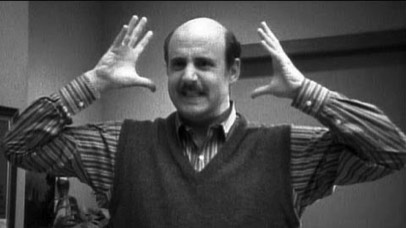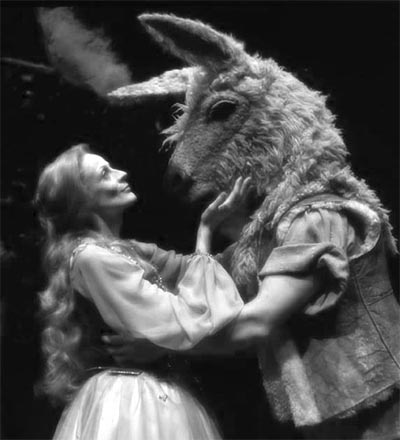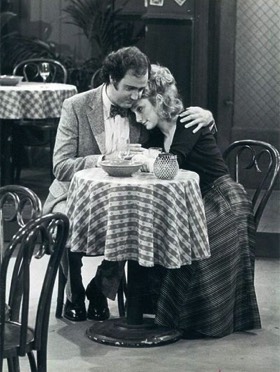Comedy is a Serious Business
Essay
Over the years, I've learned a few things about humor. Even in the broadest form of comedy, audiences have to relate to the characters and their experiences. They have to believe that the fiction happening on the screen or stage is, to some degree, real. They have to believe that the characters are real people going through real situations. American playwright Neil Simon’s comedic plays are wonderful, but they work best with brilliant actors — actors that do the same work they would do if they were doing a serious drama. In that way, the “jokes” disappear and the audiences gets transported into the story. The more immersed the audience, the more laughter.
The more an audience doesn’t believe the characters and situations, the less they laugh. The more an audience smells there are jokes in the writing, the less they will laugh.
The more an audience doesn’t believe the characters and situations, the less they laugh. The more an audience smells there are jokes in the writing, the less they will laugh.

Great writing is never enough, regardless if it's dramatic or comedic. It takes brilliant acting and directing to pull off great writing. When I was 17, my high school teacher flew a bunch of students to Stratford, England to see The Royal Shakespeare Company's A Midsummer Night’s Dream. I wasn’t looking forward to it, because we had studied Shakespeare in class, it was nothing more than a ball of confusion. However, the play was transcendent — to this day, the best piece of theater I’ve ever seen. I understood every syllable, and was taken on a ride in a forest of humor, fantasy and romance. It was hilarious and inspiring — I’ll never forget it. A couple of years later, I heard that San Francisco State University was putting on the same play. I bought several tickets and took my friends to see it. I promised them it would be the experience of their lives. Needless to say, it wasn’t. Not only was there no humor, the audience was bored silly. Same brilliant writing with an inexperienced cast and director, and you couldn’t recognize the play we saw in Stratford.
In acting classes over the years, I’ve seen this theory proven time and again. How many times have I seen classics like Death of a Salesman or The Glass Menagerie butchered on one night and sublime on another, depending on the actors and director. It's the choices directors and actors make that bring the written words to life. This is true for drama and comedy alike, but it’s in comedy where the mistake of superficial choices is most often made. Actors often take the fact that they are performing comedy to let up on the gas pedal, when they should be flooring it.

I saw a comedic play once with friends. It was terrible and not funny at all. My friends thought the writing was suspect but I knew otherwise. The actors and director made surface choices with caricatures for characters — they were not real people that the audience could relate to. My friends didn’t believe me until two weeks later, a student in our acting class did a scene from the same play. It was one of the funniest things we’d ever seen. Why? He committed to his choices and did his work. He was a real person in a real situation — not some goofy character that doesn’t exist in real life. In class, the scene got uproarious laughs and a standing ovation. In the theater, the same scene in front of a packed house got blank stares.
Similarly, I was directing a reading of my screenplay America for producers and invited guests, and we had a terrible practice read-through because the actors were treating it as a “comedy,” sketching their characters superficially. I was working with one actor to make the character more believable and his response was, “but this character is larger than life!” “Yes, but he exists!” I responded. The characters in Saturday Night Fever are also larger than life, but if you were in Brooklyn in the 70’s, you would find these very people. His character was not a cartoon, but a real person with some outrageous dialogue! When you imbue your characters with reality, they come alive for the audience. The actor understood and went home and did his homework. The next night’s reading in front of an audience was off the charts in laughs and emotions. His character, in particular, got some of the biggest laughs of he night, and all because he made him into a real person with real emotions. Two audience members told me the reading was the best thing they’d ever seen.
Even in sketch comedy, the audience wants an element of truth. The best sketch actors create characters that are realistic within the sketch comedy genre, like Mike Meyer’s Wayne in Wayne’s World, or Eddie Murphy’s Mr. Robinson. Both those characters, while "sketched" superficially, are still quite relatable, specific and real. The less depth of the choices, the more obvious the “jokes,” the less the audience is immersed and the more superficial the laughs — if any.
That’s why filmmakers will often place “based on a true story,” at the start of their film. It’s a gimmick to help the audience believe. And when you break the rule of belief, the audience will talk about it all the way home, “That would never happen…”
With humor, too often, actors and directors don’t do the same work they would do on a drama. The best sit-coms, in my opinion, had brilliant writing, acting and directing. I’m talking about shows like The Larry Sanders Show, Cheers, Taxi, M*A*S*H, Friends and others. Yes, the characters were often broad, but still believable. And that pulled the audience into the stories for a more immersive experience, and deeper laughs. Even Andy Kauffman’s broadly stroked Taxi character, Latka Gravas, was believable — that’s what made Kauffman so brilliant and difficult, he went so deep into his zany characters, many were convinced he had a disorder!

The audience needs to be transported into the story to have an emotional experience. That happens when they can relate to characters and situations — recognize them from their own lives. The more an audience believes, the more transported into the story they are, the richer their emotional ride will be. This includes laughter. The more they buy in, the richer the laughs. Actors create that "buy in" by taking comedy as seriously as they would when preparing for a drama. Ralph Kramden in The Honeymooners doesn’t hold back when he threatens to send Alice to the moon. If he did, it wouldn’t have been as funny.
However, each genre has an imaginary “too much” line. Audiences will buy into more preposterous scenarios and characters in slapstick and sketch comedy than, say a dramedy, but even within the broader genres, there is a line that must not be crossed or the audience will reject it as "too much" or "over the top. When sketch comedy doesn't work, it's often because this principle has been violated — the sketch characters are totally non-relatable or un-recognizable, even within the broad leeway of sketch. Acting coaches may also say the choices were, "not specific or too general."
Suspension of disbelief applies to all styles and genres. While the audience will allow more leeway with broader comedies, the principle of belief still applies. Yes, it’s obviously Dana Carvey in drag doing the Church Lady on Saturday Night Live, but there is something about her that we buy, even in this broad sketch. We can imagine someone like her exists in, perhaps, less exaggerated form.
Now there is a caveat — darker elements like deep hatred and real pain don’t mix too well in a comedy or risk turning it into a drama. This can be okay if that’s your story arc. Many stories start with laughs and turn in the third act to more serious tones. That’s fine and even desirable. Some of the best movies follow this structure. The Graduate is very funny up until the final act. But if that’s not your intention, too much pain and anger will push the audiences’ buttons and douse the laughs. Ralph Kramden can get angry as hell, and he genuinely is angry, but the audience knows it's all huff and puff — that underneath it all, he is really a teddy bear who loves his wife. If his emotions or actions became too dark, such as making good on his threat to strike Alice physically, then we are no longer in a comedy.
But outside of that extreme, comedy is served by digging deep and imbuing your characters with life — make them come alive as real people — however outrageous they may be. Give them strong opinions, emotions and passions. Immerse the audience in the story and the funnier it will be. The situation may be ridiculous, but the characters don’t know that — to them, it’s life and death. But from the outside, we will laugh at the insanity of it all.
— Isa Totah


